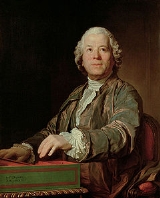
Christoph Willibald Gluck
Overview
Christoph Willibald Ritter von Gluck (2 July 1714 in Erasbach near Berching
(Upper Palatinate
) 15 November 1787 in Vienna
) was an opera
composer
of the early classical period
. After many years at the Habsburg court at Vienna, Gluck brought about the practical reform of opera's dramaturgical practices that many intellectuals had been campaigning for over the years. With a series of radical new works in the 1760s, among them Orfeo ed Euridice
and Alceste
, he broke the stranglehold that Metastasian
opera seria
had enjoyed for much of the century.
The strong influence of French opera
in these works encouraged Gluck to move to Paris, which he did in November 1773.
Berching
Berching is a town in the district of Neumarkt in Bavaria, Germany.Berching is a historical town with a fully preserved town wall and low streamlet. The first settlement was registered in 883, so that it is more than 1100 years old. is located in the district of Neumarkt in Bavaria, Germany. It is...
(Upper Palatinate
Upper Palatinate
The Upper Palatinate is one of the seven administrative regions of Bavaria, Germany, located in the east of Bavaria.- History :The region took its name first in the early 16th century, because it was by the Treaty of Pavia one of the main portions of the territory of the Wittelsbach Elector...
) 15 November 1787 in Vienna
Vienna
Vienna is the capital and largest city of the Republic of Austria and one of the nine states of Austria. Vienna is Austria's primary city, with a population of about 1.723 million , and is by far the largest city in Austria, as well as its cultural, economic, and political centre...
) was an opera
Opera
Opera is an art form in which singers and musicians perform a dramatic work combining text and musical score, usually in a theatrical setting. Opera incorporates many of the elements of spoken theatre, such as acting, scenery, and costumes and sometimes includes dance...
composer
Composer
A composer is a person who creates music, either by musical notation or oral tradition, for interpretation and performance, or through direct manipulation of sonic material through electronic media...
of the early classical period
Classical period (music)
The dates of the Classical Period in Western music are generally accepted as being between about 1750 and 1830. However, the term classical music is used colloquially to describe a variety of Western musical styles from the ninth century to the present, and especially from the sixteenth or...
. After many years at the Habsburg court at Vienna, Gluck brought about the practical reform of opera's dramaturgical practices that many intellectuals had been campaigning for over the years. With a series of radical new works in the 1760s, among them Orfeo ed Euridice
Orfeo ed Euridice
Orfeo ed Euridice is an opera composed by Christoph Willibald Gluck based on the myth of Orpheus, set to a libretto by Ranieri de' Calzabigi. It belongs to the genre of the azione teatrale, meaning an opera on a mythological subject with choruses and dancing...
and Alceste
Alceste (Gluck)
Alceste is an opera by Christoph Willibald Gluck from 1767. The libretto was written by Ranieri de' Calzabigi and based on the play Alcestis by Euripides. The premiere took place in Vienna.-Preface and reforms:...
, he broke the stranglehold that Metastasian
Metastasio
Pietro Antonio Domenico Trapassi, better known by his pseudonym of Metastasio, was an Italian poet and librettist, considered the most important writer of opera seria libretti.-Early life:...
opera seria
Opera seria
Opera seria is an Italian musical term which refers to the noble and "serious" style of Italian opera that predominated in Europe from the 1710s to c. 1770...
had enjoyed for much of the century.
The strong influence of French opera
French Opera
French opera is one of Europe's most important operatic traditions, containing works by composers of the stature of Rameau, Berlioz, Bizet, Debussy, Poulenc and Olivier Messiaen...
in these works encouraged Gluck to move to Paris, which he did in November 1773.
Unanswered Questions

